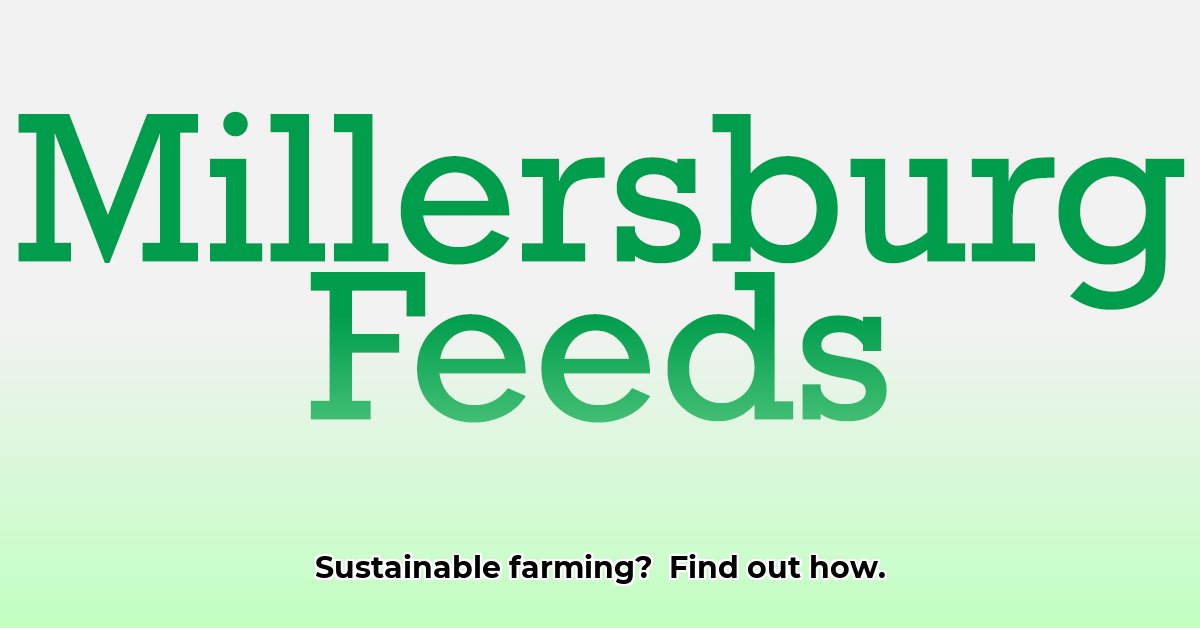
Assessing Tractor Supply's Millersburg Location and its Role in Sustainable Agriculture
This investigative report examines the contribution of the Tractor Supply store in Millersburg, Ohio, to the adoption of sustainable agricultural practices within the local community. While the store's convenient location and extended operating hours suggest potential benefits, a definitive assessment is currently hampered by significant data limitations. For example, access to equipment like sprayers could influence local farming practices. This report details our findings, highlights crucial data gaps, and proposes actionable recommendations to address this critical knowledge deficit.
Methodology and Limitations
Our investigation primarily relied on publicly available information regarding Tractor Supply's national sustainability initiatives [1] and general knowledge of the Millersburg store's location and operating hours. However, crucial data regarding the store's specific operations and impact on local sustainable farming remains inaccessible. This includes detailed product inventories, sales data segmented by product type, waste management practices, and engagement with local sustainability initiatives. The absence of this information significantly restricts the scope and depth of our analysis, preventing conclusive statements about the store's actual influence on sustainable agriculture.
Current Findings: Potential, but Unproven
The Millersburg Tractor Supply store's convenient location and extended operating hours offer potential benefits to local farmers. Easy access to necessary supplies could reduce transportation costs and emissions, indirectly supporting sustainable practices. However, this positive aspect remains speculative without concrete data on the type and quantity of sustainable products available at the store. Does the store stock organic seeds and fertilizers? Are water-efficient irrigation systems readily available? Without this information, the potential benefits cannot be substantiated.
Data Gaps and Their Implications
The absence of specific data severely limits our ability to assess Tractor Supply's impact:
Product Inventory and Sustainability: Lack of a detailed product list prevents a comprehensive analysis of the store's sustainability offerings. Are organic and sustainably sourced products prominently featured? What percentage of the inventory aligns with sustainable agricultural practices? Without this information, we cannot gauge the store's contribution to environmentally responsible farming.
Sales Data: Sales data, particularly segmented by product category, is crucial for understanding consumer demand for sustainable products. Are farmers actively purchasing eco-friendly alternatives? High sales of sustainable products would indicate a positive impact. Absence of this data hinders our ability to measure the store’s effect.
Waste Management: The store's waste management practices (recycling, composting, etc.) directly impact its environmental footprint. Information on waste reduction strategies is essential for a complete picture of the store’s sustainability efforts. The lack of this data weakens the assessment of its overall environmental performance.
Community Engagement: Information on partnerships with local organizations promoting sustainable agriculture is absent. Collaborations with local farmers' markets, agricultural extension services, or conservation groups would significantly strengthen the store's positive influence. The absence of such data obscures a potential area of significant impact.
Supply Chain Transparency: The environmental impact of the store's supply chain remains unknown. The sourcing of products, transportation methods, and packaging materials should be considered when evaluating the overall environmental performance. Without this information, it’s impossible to accurately determine the store's full footprint.
Sustainability Challenges and Opportunities for Tractor Supply
Tractor Supply faces the challenge of balancing customer demand with the promotion of sustainable practices. Increased demand for organic and eco-friendly products necessitates an expanded inventory and potentially higher costs. Addressing this is crucial for ensuring the long-term success of the store's sustainability efforts.
Opportunities exist through collaborative initiatives:
Partnerships with Local Sustainable Farmers: Actively sourcing products from local sustainable farms could enhance the store's community impact and promote regional food systems. This fosters local economic growth and demonstrates ethical business practices.
Educational Initiatives: In-store educational programs and workshops could educate farmers about sustainable agricultural techniques and promote environmentally responsible choices. This aligns the store with the community's sustainability goals.
Transparent Reporting: Publicly sharing information on sustainability initiatives would increase transparency and build stakeholder trust. This could include data on product sourcing, waste management, and community partnerships.
Recommendations for Action
To gain a clearer understanding of Tractor Supply's Millersburg location's influence on sustainable agriculture practices, the following actions are recommended:
Conduct a comprehensive product inventory: Detailing the availability of organic, sustainably sourced, and water-efficient products. This data is crucial for evaluating the store’s support for sustainable farming.
Analyze sales data: Track sales of sustainable agriculture products to determine consumer demand and the store's success in meeting this demand. This helps measure the tangible impact of the store’s offerings.
Assess waste management practices: Evaluate the store's recycling and waste reduction programs to ascertain its environmental footprint. Data on waste diversion rates are necessary for establishing its commitment to sustainability.
Investigate local partnerships: Identify any community engagement initiatives supporting sustainable agriculture. Document collaborations with local organizations to quantify the store's community impact.
Evaluate supply chain sustainability: Assess the environmental impact of the store’s supply chain, from product sourcing to transportation and packaging. A more complete understanding of the store's entire footprint is essential.
Conclusion
This report highlights the need for further investigation to fully assess the Tractor Supply Millersburg store's impact on local sustainable agriculture. While its convenient location and operating hours offer potential benefits, conclusive statements cannot be made due to significant data limitations. The recommendations outlined above provide a framework for acquiring the necessary information to establish the store’s actual role in promoting sustainable farming practices within the community. Addressing these data gaps is essential for understanding the true impact of the store’s operations and for developing effective strategies to support local sustainable agriculture initiatives.